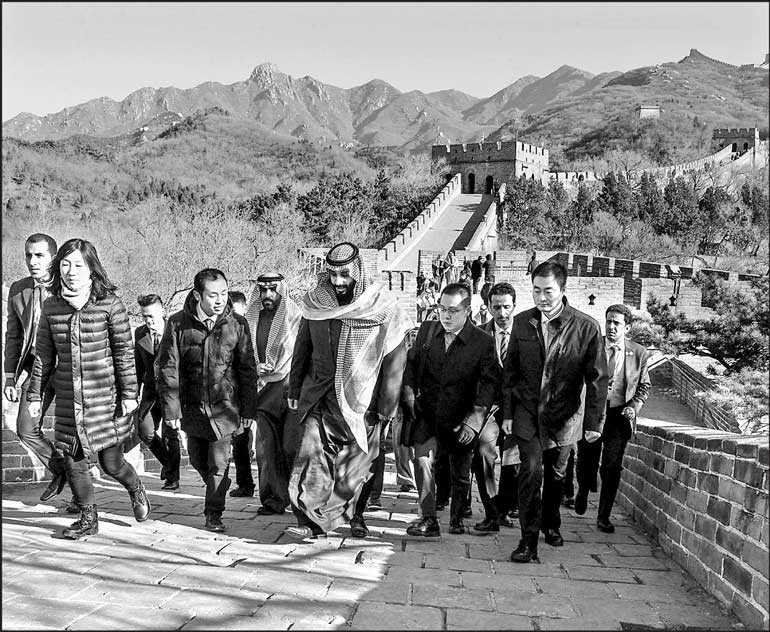Sunday Feb 22, 2026
Sunday Feb 22, 2026
Saturday, 23 February 2019 00:10 - - {{hitsCtrl.values.hits}}

Saudi Arabia’s Crown Prince Mohammed bin Salman walks with officials during his visit to Great Wall of China in Beijing, China 21 February – Bandar Algaloud/Courtesy of Saudi Royal Court/Handout via Reuters
BEIJING (Reuters): China sees ‘enormous potential’ in Saudi Arabia’s economy and wants more high-tech cooperation, the Chinese government’s top diplomat said, as Saudi Crown Prince Mohammed bin Salman began a two-day trip to Beijing.
The Saudi delegation, including top executives from Aramco, arrived on Thursday on an Asia tour that has already seen the kingdom pledge investment of $20 billion in Pakistan and seek additional investment in India’s refining industry.
The crown prince will meet President Xi Jinping, who has made stepping up China’s presence in the Middle East a key foreign policy objective, despite its traditional low-key role there.
Meeting Saudi Foreign Minister Adel al-Jubeir, State Councillor Wang Yi said the main features of their ties were respect, understanding and support for each other, China’s Foreign Ministry said in a statement late on Thursday.
“All countries in the world have the right to develop, and Saudi Arabia is an emerging market country with enormous potential,” the ministry paraphrased Wang as saying.
China supports Saudi’s efforts to diversify its economy and is willing to strengthen high-tech cooperation, Wang added.
Saudi Aramco, the world’s top oil exporter, will sign a pact to build a refinery and petrochemical project in northeastern Liaoning province in a joint venture with China’s defence conglomerate Norinco, three sources with knowledge of the matter said.
The investments could help Saudi Arabia regain its place as the top oil exporter to China, a position Russia has held for the last three years.
Saudi Aramco is set to boost market share by signing supply deals with non-state Chinese refiners.
China has had to step carefully in relations with Riyadh, since Beijing also has close ties with Saudi regional foe Iran.
On Wednesday, Xi told the speaker of Iran’s parliament that China’s desire to develop close ties with Iran would stay unaltered, regardless of the global situation.
China is also wary of criticism from Muslim countries about its camps in the heavily-Muslim far western region of Xinjiang, which the government says are for de-radicalisation purposes and rights groups call internment camps.Wang said both countries face the threats of terrorism and extremism, and should strengthen cooperation to safeguard security and stability.
China was not seeking to play politics in the Middle East, the widely-read state-run tabloid, the Global Times, said in an editorial on Friday.
“China won’t be a geopolitical player in the Middle East. It has no enemies and can cooperate with all countries in the region,” said the paper, published by the ruling Communist Party’s official People’s Daily.
“China’s increasing influence in the Middle East comes from pure friendly cooperation. Such a partnership will be welcomed by more countries in the Middle East.”